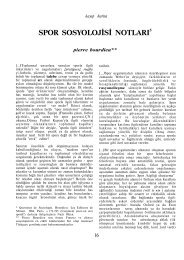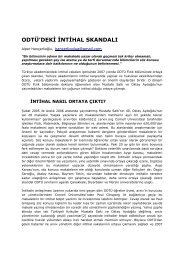Untitled
Untitled
Untitled
You also want an ePaper? Increase the reach of your titles
YUMPU automatically turns print PDFs into web optimized ePapers that Google loves.
38 THE SALARIED MASSES<br />
usually today outward appearance plays a decisive role, and in order to<br />
be rejected you need not even have rickets. 'With the huge supply of<br />
labour', writes the Social-Democrat deputy Dr Julius Moses, 'a certain<br />
physical "selection" inevitably occurs. Conspicuous bodily imperfections,<br />
though they may not in the least impair fitness for work,<br />
prematurely force socially vulnerable people out of work and into<br />
invalidity' (Aja-Bundeszeitung, February 1929). That this is so, and not<br />
just with employees who come into direct contact with the public, is<br />
confirmed from many sides. An official in a Berlin job centre explains<br />
to me how people with physical defects - people who limp, for instance,<br />
or even who write lefthanded - are regarded as disabled and are<br />
particularly hard to place. They are frequently retrained. The official<br />
makes no bones about the reduced marketability of wrinkles and grey<br />
hair. I try to learn from him what magical properties a person's<br />
appearance must possess in order to open the gates of the firm. The<br />
terms 'nice' and 'friendly' recur like stock phrases in his reply. Above<br />
all employers want to receive a nice impression. People who appear<br />
nice - and nice manners are naturally part of the appearance - are<br />
taken on even if their references are poor. The official says: 'We have<br />
to do things the same way as the Americans do. The man must have a<br />
friendly face.' In order to increase the man's friendliness, the job centre<br />
:identally requires him to apply with shaven cheeks and in his best<br />
suit. The works-council chairman of one big firm likewise recommends<br />
employees to turn out in the martial trappings of their Sunday best<br />
when their boss is coming for a visit. One piece of information that I<br />
obtain in a well-known Berlin department store is particularly instructive:<br />
'When taking on sales and office staff' says an influential gentleman<br />
from the personnel department, 'we attach most importance to a<br />
pleasant appearance. From a distance he looks a bit like Reinhold<br />
Schiinzel in early films.3 I ask him what he understands by 'pleasant'<br />
saucy or pretty. 'Not exactly pretty. What's far more crucial is oh,<br />
you know, a morally pink complexion.'<br />
I do know. A morally pink complexion - this combination of concepts<br />
at a stroke renders transparent the everyday life that is fleshed out by<br />
window displays, salary-earners and illustrated papers. Its morality must<br />
have a pink hue, its pink a moral grounding. That is what the people<br />
�sponsible for selection want. They would like to cover life with a<br />
varnish concealing its far-from-rosy reality. But beware, if morality<br />
should penetrate beneath the skin, and the pink be not quite moral<br />
enough 1.0 prevent the eruption of desires! The gloom of unadorned<br />
:\. Reinhold Schiinzel (1888-1954) specialized in portraying elegant villains on stage<br />
and screen; he wa� Tiger Brown in Pabst's 1931 Dreigroschenoper.






